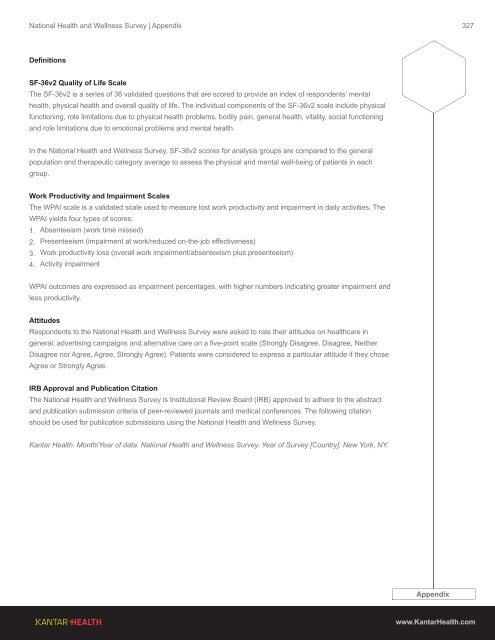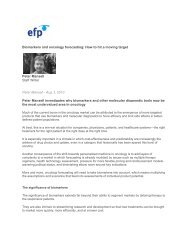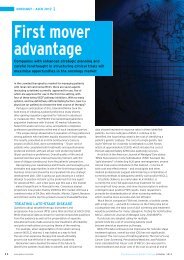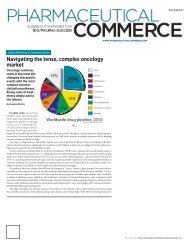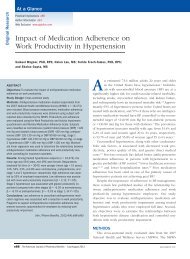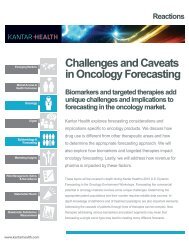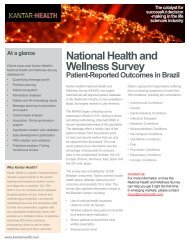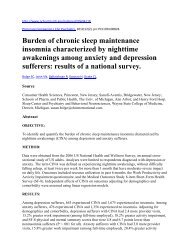- Page 3:
National Health and Wellness Survey
- Page 11 and 12:
National Health and Wellness Survey
- Page 14 and 15:
National Health and Wellness Survey
- Page 16 and 17:
National Health and Wellness Survey
- Page 18 and 19:
National Health and Wellness Survey
- Page 20 and 21:
National Health and Wellness Survey
- Page 23 and 24:
National Health and Wellness Survey
- Page 25 and 26:
National Health and Wellness Survey
- Page 27 and 28:
National Health and Wellness Survey
- Page 30 and 31:
National Health and Wellness Survey
- Page 32 and 33:
National Health and Wellness Survey
- Page 34 and 35:
National Health and Wellness Survey
- Page 36 and 37:
National Health and Wellness Survey
- Page 38 and 39:
National Health and Wellness Survey
- Page 40 and 41:
National Health and Wellness Survey
- Page 42 and 43:
National Health and Wellness Survey
- Page 44 and 45:
National Health and Wellness Survey
- Page 46 and 47:
National Health and Wellness Survey
- Page 48 and 49:
National Health and Wellness Survey
- Page 50 and 51:
National Health and Wellness Survey
- Page 52 and 53:
National Health and Wellness Survey
- Page 54 and 55:
National Health and Wellness Survey
- Page 56 and 57:
National Health and Wellness Survey
- Page 58 and 59:
National Health and Wellness Survey
- Page 60 and 61:
National Health and Wellness Survey
- Page 62 and 63:
National Health and Wellness Survey
- Page 64 and 65:
National Health and Wellness Survey
- Page 66 and 67:
Chinawww.KantarHealth.com
- Page 68 and 69:
National Health and Wellness Survey
- Page 70 and 71:
National Health and Wellness Survey
- Page 72 and 73:
National Health and Wellness Survey
- Page 74 and 75:
National Health and Wellness Survey
- Page 76 and 77:
National Health and Wellness Survey
- Page 78 and 79:
National Health and Wellness Survey
- Page 80 and 81:
National Health and Wellness Survey
- Page 82 and 83:
National Health and Wellness Survey
- Page 84 and 85:
National Health and Wellness Survey
- Page 86 and 87:
National Health and Wellness Survey
- Page 88 and 89:
National Health and Wellness Survey
- Page 90 and 91:
National Health and Wellness Survey
- Page 92 and 93:
National Health and Wellness Survey
- Page 94 and 95:
National Health and Wellness Survey
- Page 96 and 97:
National Health and Wellness Survey
- Page 98 and 99:
National Health and Wellness Survey
- Page 100 and 101:
National Health and Wellness Survey
- Page 102 and 103:
National Health and Wellness Survey
- Page 104 and 105:
National Health and Wellness Survey
- Page 106 and 107:
National Health and Wellness Survey
- Page 108 and 109:
National Health and Wellness Survey
- Page 110 and 111:
National Health and Wellness Survey
- Page 112 and 113:
National Health and Wellness Survey
- Page 114 and 115:
National Health and Wellness Survey
- Page 116 and 117:
National Health and Wellness Survey
- Page 118 and 119:
National Health and Wellness Survey
- Page 120 and 121:
National Health and Wellness Survey
- Page 122 and 123:
National Health and Wellness Survey
- Page 124 and 125:
Germanywww.KantarHealth.com
- Page 126 and 127:
National Health and Wellness Survey
- Page 128 and 129:
National Health and Wellness Survey
- Page 130 and 131:
National Health and Wellness Survey
- Page 132 and 133:
National Health and Wellness Survey
- Page 134 and 135:
National Health and Wellness Survey
- Page 136 and 137:
National Health and Wellness Survey
- Page 138 and 139:
National Health and Wellness Survey
- Page 140 and 141:
National Health and Wellness Survey
- Page 142 and 143:
National Health and Wellness Survey
- Page 144 and 145:
National Health and Wellness Survey
- Page 146 and 147:
National Health and Wellness Survey
- Page 148 and 149:
National Health and Wellness Survey
- Page 150 and 151:
National Health and Wellness Survey
- Page 152 and 153:
National Health and Wellness Survey
- Page 154 and 155:
National Health and Wellness Survey
- Page 156 and 157:
National Health and Wellness Survey
- Page 158 and 159:
National Health and Wellness Survey
- Page 160 and 161:
National Health and Wellness Survey
- Page 162 and 163:
National Health and Wellness Survey
- Page 164 and 165:
National Health and Wellness Survey
- Page 166 and 167:
National Health and Wellness Survey
- Page 168 and 169:
National Health and Wellness Survey
- Page 170 and 171:
National Health and Wellness Survey
- Page 172 and 173:
National Health and Wellness Survey
- Page 174 and 175:
National Health and Wellness Survey
- Page 176 and 177:
National Health and Wellness Survey
- Page 178 and 179:
National Health and Wellness Survey
- Page 180 and 181:
National Health and Wellness Survey
- Page 182 and 183:
Japanwww.KantarHealth.com
- Page 184 and 185:
National Health and Wellness Survey
- Page 186 and 187:
National Health and Wellness Survey
- Page 188 and 189:
National Health and Wellness Survey
- Page 190 and 191:
National Health and Wellness Survey
- Page 192 and 193:
National Health and Wellness Survey
- Page 194 and 195:
National Health and Wellness Survey
- Page 196 and 197:
National Health and Wellness Survey
- Page 198 and 199:
National Health and Wellness Survey
- Page 200 and 201:
National Health and Wellness Survey
- Page 202 and 203:
National Health and Wellness Survey
- Page 204 and 205:
National Health and Wellness Survey
- Page 206 and 207:
National Health and Wellness Survey
- Page 208 and 209:
National Health and Wellness Survey
- Page 210 and 211:
National Health and Wellness Survey
- Page 212 and 213:
National Health and Wellness Survey
- Page 214 and 215:
National Health and Wellness Survey
- Page 216 and 217:
National Health and Wellness Survey
- Page 218 and 219:
National Health and Wellness Survey
- Page 220 and 221:
National Health and Wellness Survey
- Page 222 and 223:
National Health and Wellness Survey
- Page 224 and 225:
National Health and Wellness Survey
- Page 226 and 227:
National Health and Wellness Survey
- Page 228 and 229:
National Health and Wellness Survey
- Page 230 and 231:
National Health and Wellness Survey
- Page 232 and 233:
National Health and Wellness Survey
- Page 234 and 235:
National Health and Wellness Survey
- Page 236 and 237:
National Health and Wellness Survey
- Page 238 and 239:
National Health and Wellness Survey
- Page 240 and 241:
Spainwww.KantarHealth.com
- Page 242 and 243:
National Health and Wellness Survey
- Page 244 and 245:
National Health and Wellness Survey
- Page 246 and 247:
National Health and Wellness Survey
- Page 248 and 249:
National Health and Wellness Survey
- Page 250 and 251:
National Health and Wellness Survey
- Page 252 and 253:
National Health and Wellness Survey
- Page 254 and 255:
National Health and Wellness Survey
- Page 256 and 257:
National Health and Wellness Survey
- Page 258 and 259:
National Health and Wellness Survey
- Page 260 and 261:
National Health and Wellness Survey
- Page 262 and 263:
National Health and Wellness Survey
- Page 264 and 265:
National Health and Wellness Survey
- Page 266 and 267:
National Health and Wellness Survey
- Page 268 and 269:
National Health and Wellness Survey
- Page 270 and 271:
National Health and Wellness Survey
- Page 272 and 273:
National Health and Wellness Survey
- Page 274 and 275:
National Health and Wellness Survey
- Page 276 and 277:
National Health and Wellness Survey
- Page 278 and 279: National Health and Wellness Survey
- Page 280 and 281: National Health and Wellness Survey
- Page 282 and 283: National Health and Wellness Survey
- Page 284 and 285: National Health and Wellness Survey
- Page 286 and 287: National Health and Wellness Survey
- Page 288 and 289: National Health and Wellness Survey
- Page 290 and 291: National Health and Wellness Survey
- Page 292 and 293: National Health and Wellness Survey
- Page 294 and 295: National Health and Wellness Survey
- Page 296 and 297: National Health and Wellness Survey
- Page 298 and 299: United Stateswww.KantarHealth.com
- Page 300 and 301: National Health and Wellness Survey
- Page 302 and 303: National Health and Wellness Survey
- Page 304 and 305: National Health and Wellness Survey
- Page 306 and 307: National Health and Wellness Survey
- Page 308 and 309: National Health and Wellness Survey
- Page 310 and 311: National Health and Wellness Survey
- Page 312 and 313: National Health and Wellness Survey
- Page 314 and 315: National Health and Wellness Survey
- Page 316 and 317: National Health and Wellness Survey
- Page 318 and 319: National Health and Wellness Survey
- Page 320 and 321: National Health and Wellness Survey
- Page 322 and 323: National Health and Wellness Survey
- Page 324 and 325: National Health and Wellness Survey
- Page 326 and 327: National Health and Wellness Survey
- Page 330: The Global Health and Wellness Repo


